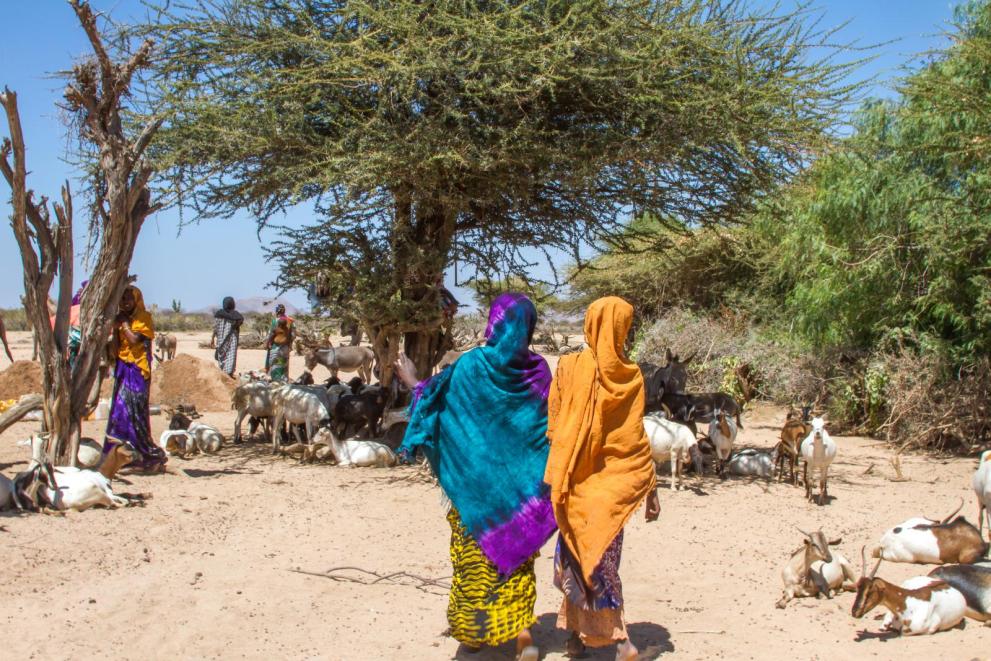
In 2019 alone, the Emergency Trust Fund for Africa (EUTF) in the Horn of Africa has assisted 3,600 returning migrants, including through immediate assistance on arrival, psychosocial support, skills training, education or medical help. Furthermore, close to 1 million basic services, most of which health related services, were delivered last year.
These are some of the main results of the 8th Monitoring and Learning System (MLS) report of the EUTF, which provides an overview of the EUTF's response to the challenges of the Horn of Africa region in 2019. The report includes comprehensive descriptions and explanations on indicators, methodology, challenges, and limitations. It provides information on 102 projects, equivalent to €862 million in funding.
You can find the full MLS 2019 report here, including results by country. Results per indicator can be found in the annexes.
Greater economic and employment opportunities
More than 188,500 people have been assisted to develop income-generating activities, close to 85,000 of these were assisted in 2019 alone. Particularly in Ethiopia, achievements remain quiet remarkable: 8,500 new jobs were created in the country in 2019 and over 16,100 in total since the start of the EUTF.
In 2019, more than 3,000 Micro, Small & Medium Enterprises were created or supported and 18,400 jobs were created across the region. This brings the total number of MSME’s supported to close to 5,000 and the total number of jobs created to 36,100.
Strengthening resilience of communities and in particular the most vulnerable including refugees and other displaced people
Almost 1 million basic services were delivered last year, 82% of these were health-related. In 2019, close to 1 million benefited from improved access to basic services. This was mainly due to the rehabilitation or construction of facilities and the improved capacity of service providers. For example, 148 water-related infrastructures were built in Somalia thanks to the CrossBorder BORESHA DRC, the RE-INTEG and RESTORE programmes. 101 schools were built, rehabilitated or expanded by RE-INTEG projects in Somalia, and another 101 schools were provided with gender-segregated water, sanitation and hygiene (WASH) facilities in South Sudan by Education in Emergency UNICEF.
In total, since the start of its implementation, close to 5 million people now have better access to basic services.
Improved migration management in countries of origin, transit and destination
Last year, more than 3,600 returning migrants benefited from reintegration assistance in the Horn of Africa, including immediate assistance on arrival, psychosocial support, skills training, education or medical help. So far, more than 32,900 returning migrants were supported through the EUTF in this region.
The EUTF also supported capacity building on migration for a total of 452 institutions and non-state actors, of which more than 250 were supported in 2019. Regional projects remain the main contributors to this strategic objective, through interventions such as the EU-IOM Joint Initiative and the Better Migration Management (BMM) programme.
12% of the EUTF HoA contracted budget so far supports activities directly related to migration management, particularly through regional interventions. You can find a break down by all four strategic in the report.
Improved governance and conflict prevention and reduction of forced displacement and irregular migration
Over 56,800 individuals have so far participated in peacebuilding activities in the Horn of Africa region, including more than 31,300 in 2019 alone.
To date, the EUTF has also trained more than 21,700 individuals on security and governance, delivering conflict prevention-related training to more than 14,300 staff and members of key actors involved in social cohesion and peace dynamics. For example, the SPRS-NU DRC project trained more than 6,200 community actors on conflict sensitivity approaches regarding land management, over 1,500 local courts’ staff and community leaders on dispute resolution, and more than 1,000 peer educators on gender based violence (GBV) in north-western provinces of Uganda.
Details
- Publication date
- 9 July 2020
- Region and Country
- Horn of Africa
- Thematic
- Other
